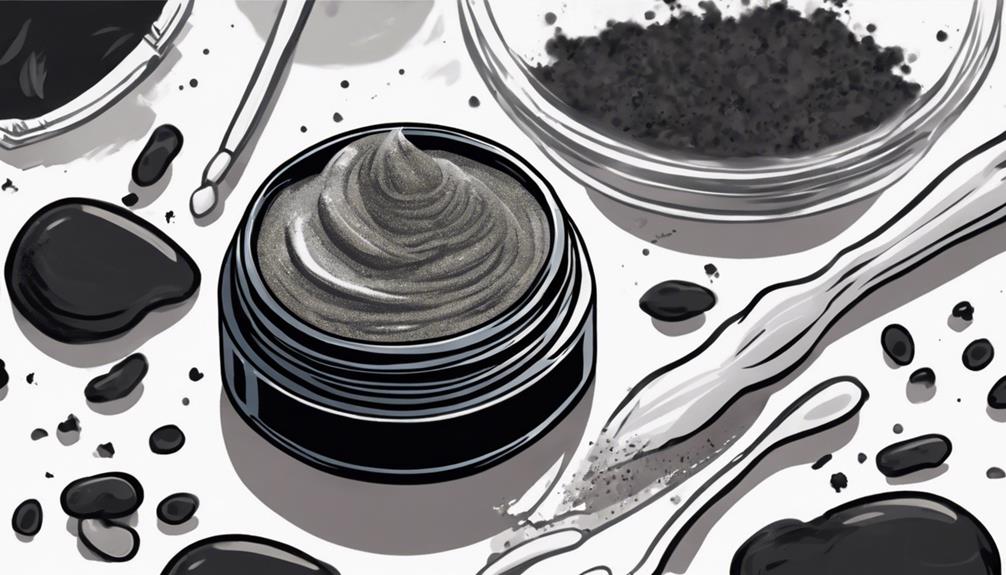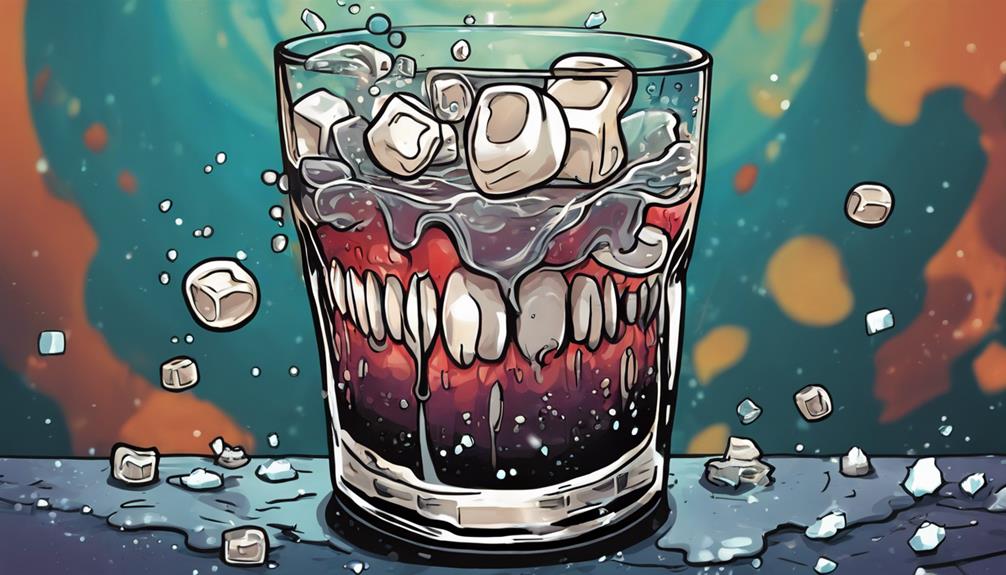Charcoal toothpaste claims to whiten your teeth naturally, but its effectiveness is questionable. Studies show it mainly removes surface stains, leaving intrinsic stains unaffected. Plus, many products are overly abrasive, risking enamel erosion and increased sensitivity. Without fluoride, you could face a higher chance of cavities. Dental professionals often advise against regular use, highlighting the lack of ADA approval for safety. While some may swear by it, there's a better approach to teeth whitening that preserves your dental health. If you're curious about safer alternatives and professional recommendations, there's more to explore.
Key Takeaways
- Charcoal toothpaste primarily targets superficial surface stains but lacks effectiveness against intrinsic stains, leading to limited whitening results.
- The American Dental Association (ADA) has not approved any charcoal toothpaste, citing safety and efficacy concerns.
- High abrasiveness of charcoal toothpaste poses risks of enamel erosion, increasing tooth sensitivity and gum irritation.
- Many charcoal toothpaste products omit fluoride, essential for cavity prevention and enamel strength, raising oral health risks.
Overview of Activated Charcoal
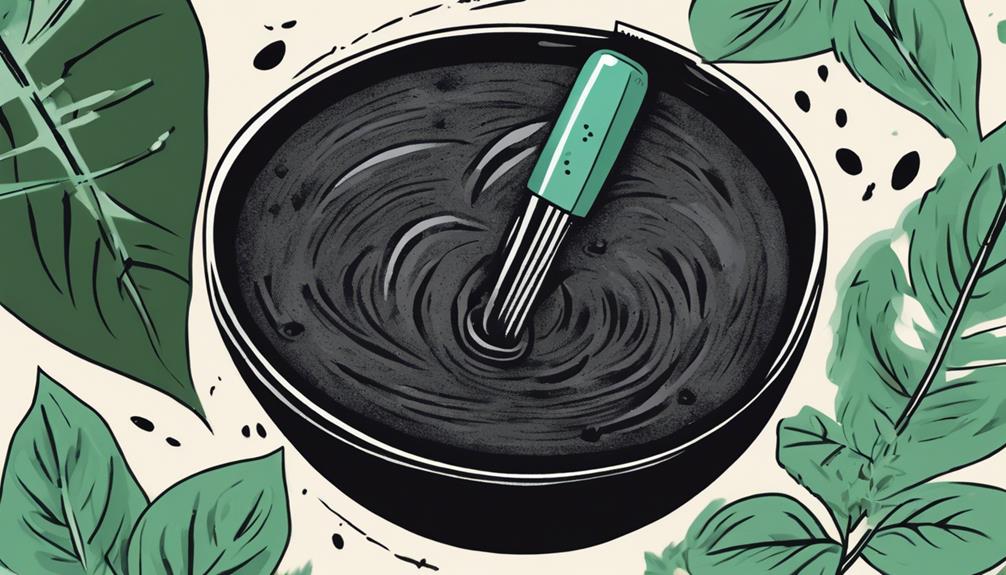
Activated charcoal, a highly absorbent form of carbon created by heating organic materials, is often touted for its potential benefits in dental care. Its porous nature makes it effective in absorbing toxins, which is why it's widely used in medicine. However, when it comes to oral health, the application of activated charcoal is both new and controversial.
You might find products that claim to whiten teeth by binding to plaque and stains, but the American Dental Association (ADA) has found no scientific evidence supporting these claims.
One major concern with activated charcoal is its abrasiveness. While you may think it's a natural alternative for maintaining a bright smile, this very property can be damaging. Over time, the abrasiveness of activated charcoal can wear down your tooth enamel, leading to increased sensitivity and even more staining rather than improving your oral health.
As you consider incorporating activated charcoal into your dental routine, it's essential to weigh its purported benefits against the potential risks. Your dental health should always be a priority, and consulting with a dental professional is a wise step before trying new products.
Claims of Charcoal Toothpaste
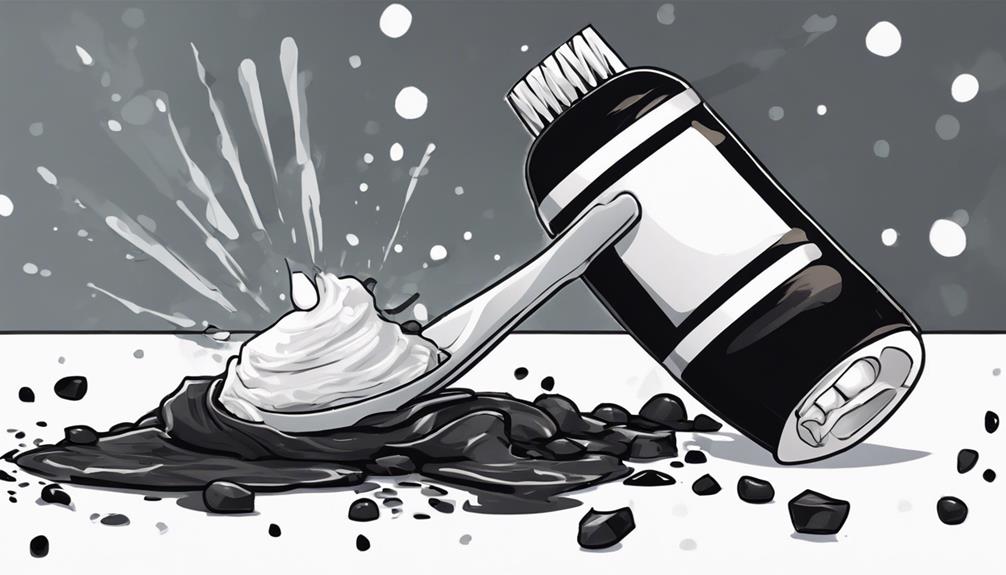
Many brands claim that charcoal toothpaste can effectively absorb stains and whiten teeth, but the evidence supporting these assertions is largely unconvincing. While charcoal toothpaste products may temporarily remove surface stains, they struggle to address deeper, intrinsic stains beneath the enamel. The American Dental Association (ADA) hasn't found compelling evidence proving these products offer significant oral health benefits, leaving many dental professionals skeptical.
Here's a look at some common claims versus the reality:
| Claim | Reality |
|---|---|
| Absorbs staining molecules | Limited effectiveness on intrinsic stains |
| Natural alternative to whitening | High abrasiveness risks enamel damage |
| Promotes better oral health | Lacks fluoride, essential for cavity prevention |
| Effective whitening solution | Studies show no significant color change |
| Safe for daily use | Potential increased sensitivity over time |
Ultimately, while you might see some immediate results with charcoal toothpaste, the long-term impacts on your enamel and overall dental health raise serious questions. Being informed can help you make the best choice for your smile.
Safety and Risks
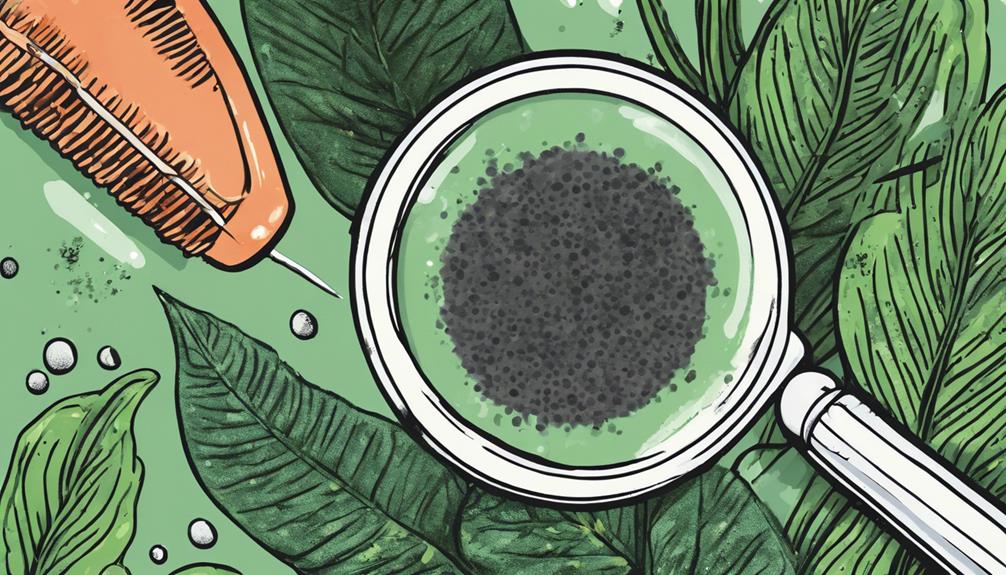
When considering charcoal toothpaste, you need to be aware of its potential risks.
Its abrasive nature can lead to enamel erosion and increased sensitivity, while the lack of fluoride in many formulas raises concerns about cavity prevention.
Understanding these factors is essential for making an informed choice about your oral health.
Enamel Erosion Risks
Charcoal toothpaste can pose significant risks to your enamel due to its high abrasiveness, often exceeding safe limits. Many brands go beyond the American Dental Association's recommended Relative Dentin Abrasivity (RDA) threshold of 250, leading to noticeable enamel erosion.
As you continue using charcoal toothpaste, you might find your enamel thinning, which can expose the sensitive dentin beneath. This not only increases your risk of tooth sensitivity but also makes your teeth more prone to staining and decay.
Moreover, many charcoal toothpaste products lack fluoride, which is important for strengthening enamel and preventing cavities. Without this protective mineral, your teeth may become even more susceptible to damage.
Dental professionals generally discourage regular use of charcoal toothpaste, emphasizing that the potential for enamel erosion can have long-lasting impacts on your oral health.
If you're considering charcoal toothpaste, it's crucial to weigh these risks against any perceived benefits. Your enamel is essential for protecting your teeth, and once it's gone, it can't be replaced.
Prioritizing dental products with fluoride and lower abrasiveness is a safer choice for maintaining your smile.
Abrasiveness and Sensitivity
The high abrasiveness of charcoal toothpaste not only threatens your enamel but can also lead to increased tooth sensitivity, especially if you have weakened enamel. Many charcoal toothpaste formulations exceed the American Dental Association's recommended Relative Dentin Abrasivity (RDA) limit of 250, heightening the risk of significant enamel wear. Over time, this erosion exposes the underlying dentin, making your teeth more susceptible to stains and sensitivity.
If you've already experienced enamel thinning, you might notice that using charcoal toothpaste exacerbates your tooth sensitivity. The abrasive nature of this toothpaste can also irritate your gums, potentially leading to gum recession and further dental issues.
While some people may seek out charcoal toothpaste for its whitening effects, the risks associated with its use can't be ignored. Regularly using highly abrasive toothpaste not only compromises your enamel but may also leave you with heightened sensitivity that can affect your daily life.
It's crucial to weigh these risks carefully against any perceived benefits and consider alternatives that are gentler on your teeth and gums. Always consult your dentist before making significant changes to your oral care routine.
Lack of Fluoride
Many charcoal toothpaste products omit fluoride, which is vital for strengthening your enamel and preventing cavities. This lack of fluoride can lead to increased susceptibility to tooth decay, making it a significant concern for your oral health. While charcoal may seem appealing for its natural whitening properties, it doesn't provide the protective benefits that fluoride does.
Studies suggest that charcoal might even bind to fluoride, reducing its effectiveness. This means that if you use charcoal toothpaste as your primary oral care product, you could be setting yourself up for higher rates of dental issues, including cavities and enamel erosion. Without fluoride, your teeth are less likely to resist decay, putting your smile at risk.
The American Dental Association has voiced concerns about the use of charcoal toothpaste, primarily due to its lack of fluoride. They don't endorse these products, highlighting the potential risks associated with enamel damage and compromised oral health.
If you're considering charcoal toothpaste, it's important to weigh these factors and make sure you maintain a fluoride-rich dental care routine to protect your teeth effectively.
Effects on Dental Health

Using charcoal toothpaste can harm your dental health by causing enamel erosion and increasing sensitivity over time. The abrasiveness of these products can lead to visible thinning of your enamel, making your teeth more prone to sensitivity and staining. As you regularly use charcoal toothpaste, you might notice that your enamel wears away, exposing the yellow dentin underneath.
Here's a summary of potential effects on your oral health:
| Effect | Description | Consequence |
|---|---|---|
| Enamel Erosion | Thinning of enamel due to abrasiveness | Increased sensitivity and staining |
| Gum Irritation | Long-term use can irritate your gums | Potential gum damage |
| Lack of Fluoride | Most charcoal toothpaste lacks fluoride | Higher risk of cavities |
| Oral Health Risks | Risks may outweigh potential benefits | Compromised overall oral health |
The American Dental Association (ADA) emphasizes that using charcoal toothpaste poses risks that can negatively impact your oral health. It is crucial to weigh these factors and consider safer alternatives for maintaining your dental hygiene.
Efficacy of Whitening
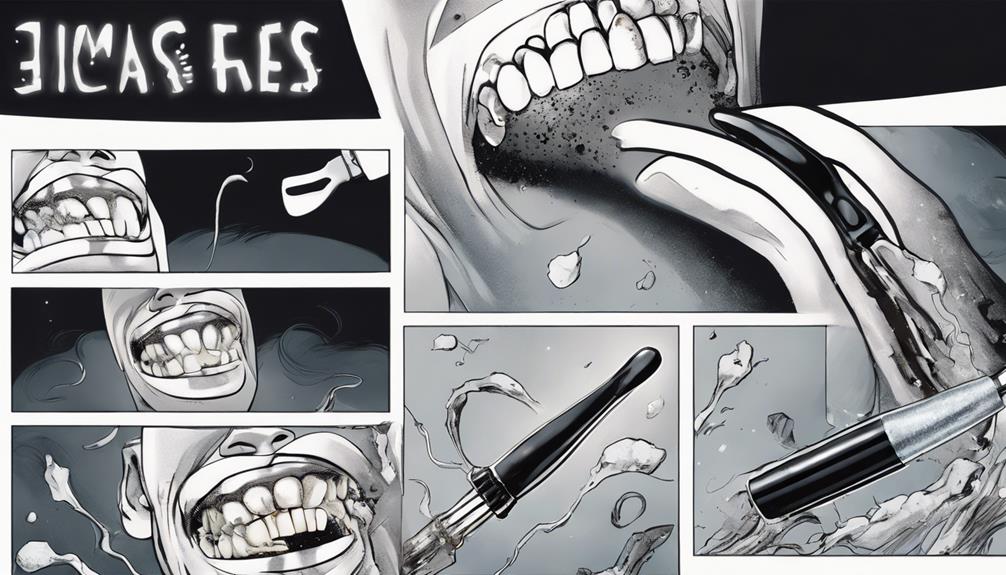
When it comes to whitening, charcoal toothpaste mainly targets surface stains, leaving deeper intrinsic stains untouched.
You might notice some temporary whitening effects, but scientific evidence shows it doesn't provide significant results compared to standard fluoridated toothpaste.
Understanding these limitations can help you make more informed choices about your dental care.
Surface Stain Removal
Charcoal toothpaste can help remove superficial surface stains on teeth due to its mild abrasiveness, but it doesn't effectively tackle deeper intrinsic stains. While you might notice some improvement in the appearance of your teeth from the removal of these surface stains, the results aren't as significant as you might hope.
A study in 2021 revealed no substantial difference in enamel color change between charcoal toothpaste and fluoridated options, indicating limited effectiveness for whitening. Activated charcoal's porous structure may lead you to believe it binds to staining molecules, but its primary function is scraping away surface stains rather than delivering real whitening benefits.
Additionally, if you use charcoal toothpaste over the long term, you risk enamel erosion. This erosion can expose the yellow dentin beneath, potentially making your teeth look worse over time.
Many dental professionals voice skepticism about the whitening claims of charcoal toothpaste, asserting that proven methods like professional whitening treatments are far more effective for extensive stain removal. So, while charcoal toothpaste might help with surface stains, you should be cautious and consider other options for achieving a truly whiter smile.
Intrinsic Stain Limitations
While charcoal toothpaste may help with surface stains, it falls short in addressing the deeper intrinsic stains that truly affect your smile's brightness. This is because charcoal toothpaste primarily targets surface discoloration through mild abrasiveness but doesn't penetrate the enamel to tackle stains that lie beneath.
Intrinsic stains, caused by factors such as aging, genetics, or certain medications, require more than what charcoal toothpaste can offer. A 2021 study showed no significant difference in enamel color changes between charcoal toothpaste and fluoridated alternatives, highlighting its limitations in effective whitening.
Many marketing claims suggest that charcoal toothpaste can whiten your teeth by addressing intrinsic stains, but these assertions lack scientific backing.
To achieve true whitening, you'll need to evaluate professional treatments that utilize stronger agents specifically designed to penetrate the enamel and reach those deeper stains.
Scientific Evidence Gap
There's a noticeable gap in scientific evidence regarding the efficacy of charcoal toothpaste for whitening teeth. Despite the marketing hype, studies show no significant difference in enamel color change between charcoal toothpaste and fluoridated alternatives. The American Dental Association (ADA) hasn't endorsed charcoal toothpaste due to insufficient evidence supporting its whitening claims.
Charcoal toothpaste may remove surface stains temporarily, but it falls short against intrinsic stains hidden beneath the enamel. Additionally, the abrasiveness of charcoal can potentially lead to enamel erosion rather than effective whitening. While many brands boast impressive whitening results, most of these claims lack robust scientific backing, highlighting the pressing need for more thorough research.
You might find yourself drawn to charcoal toothpaste by enticing promises of a brighter smile, but it's crucial to approach these claims with skepticism. With the current scientific evidence gap, relying solely on charcoal toothpaste for whitening may not be the best option.
Instead, consider consulting with dental professionals for proven whitening methods that can deliver real results without risking your enamel's health.
Alternatives for Whitening

If you're looking for effective teeth whitening options, ADA-approved products like whitening toothpaste, strips, and gel trays are safer choices than charcoal toothpaste. These products are designed to brighten your smile without the potential risks associated with charcoal.
Consider these alternatives:
- Whitening Toothpaste: Look for options with the ADA Seal of Acceptance; they're formulated to safely remove surface stains.
- Whitening Strips: These are easy to use and provide noticeable results in a short time, making them a popular choice.
For those seeking quicker results, professional in-office whitening is another viable option. This treatment typically provides faster and more dramatic outcomes, tailored to your specific needs.
Additionally, maintaining a balanced diet and limiting stain-causing foods, like coffee and red wine, can help preserve your teeth's whiteness.
Regular dental cleanings every six months also play an essential role in maintaining your tooth color, enhancing the effectiveness of any whitening efforts you choose.
Professional Recommendations
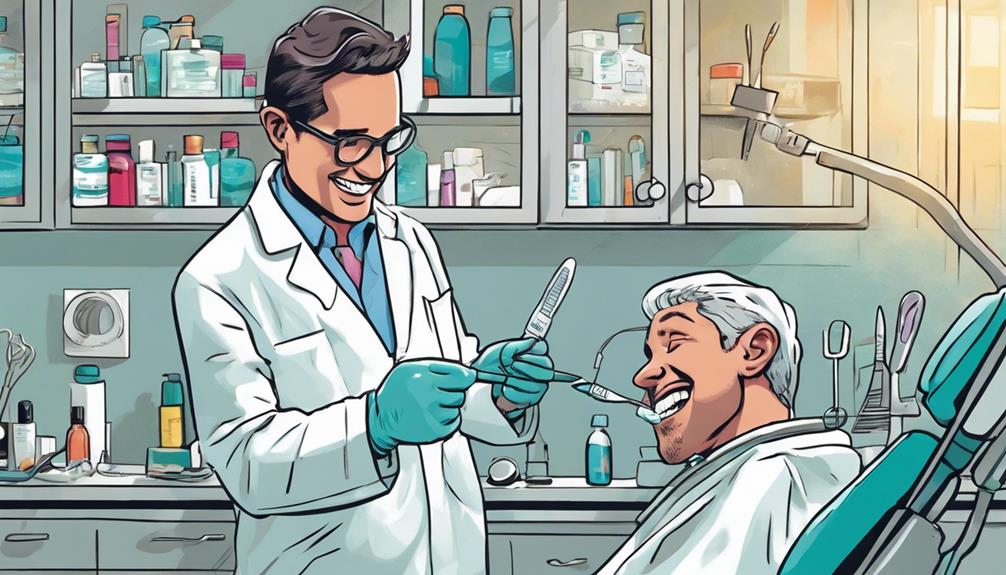
Dental professionals strongly discourage the regular use of charcoal toothpaste due to its abrasive nature and potential risks to your enamel. Using such products can lead to enamel erosion, which increases tooth sensitivity and can result in long-term damage.
The American Dental Association (ADA) hasn't approved any charcoal toothpaste for safety or efficacy, pointing out that there's a lack of compelling evidence supporting its oral health benefits. Moreover, many charcoal toothpaste formulations don't contain fluoride, a vital ingredient for preventing cavities and strengthening tooth enamel. Without fluoride, your risk of developing dental issues increases, which is a significant concern for dental professionals.
While charcoal toothpaste may remove some surface stains, it's ineffective against deeper intrinsic stains, meaning you'll likely need professional whitening treatments for those. For ideal oral hygiene, dentists recommend sticking to ADA-approved products and maintaining a balanced routine, including regular dental cleanings.
Before trying new dental care products like charcoal toothpaste, it's best to consult your dentist to make sure you're making safe choices for your dental health.
Consumer Misconceptions

Many people wrongly believe that charcoal toothpaste is a natural and effective alternative to traditional toothpaste, despite evidence to the contrary. Consumer misconceptions surrounding charcoal toothpaste can be misleading and can negatively impact your oral health.
Here are a few common myths:
- Charcoal toothpaste effectively whitens teeth and removes deep stains.
- It's a suitable replacement for fluoride toothpaste, providing adequate cavity protection.
In reality, while charcoal toothpaste may remove surface stains, it doesn't tackle deeper discoloration. Most formulations lack fluoride, essential for preventing cavities and maintaining strong teeth. Additionally, the abrasiveness that some users find appealing can actually lead to enamel erosion and increased sensitivity over time.
It's vital to approach charcoal toothpaste with skepticism. No product has received the American Dental Association's Seal of Acceptance, which underscores its safety and effectiveness compared to traditional options. While some people claim to have experienced whiter teeth and fresher breath from using charcoal toothpaste, there is not enough scientific evidence to support these claims. Additionally, there are potential risks associated with using charcoal toothpaste, such as enamel erosion and damage to the gums. Therefore, it is important to weigh the potential benefits of charcoal toothpaste against its potential risks before deciding to use it.
Always prioritize proven oral health practices, and consider consulting your dentist before making any changes to your dental care routine.
Frequently Asked Questions
Do Dentists Recommend Charcoal Toothpaste?
Most dentists don't recommend charcoal toothpaste due to its abrasiveness and lack of fluoride. They emphasize using clinically proven toothpaste for better oral health, cavity prevention, and overall effectiveness in maintaining your dental hygiene.
Does Charcoal Toothpaste Actually Work?
Charcoal toothpaste doesn't really work effectively for whitening. It mainly scrapes away surface stains, and its abrasiveness can harm your enamel. You might consider sticking to fluoride toothpaste for better oral health and protection.
What Is the Science Behind Charcoal Toothpaste?
Charcoal toothpaste claims to be a miracle worker for your teeth, but it mainly relies on abrasiveness to scrub away surface stains. Unfortunately, science shows it lacks effectiveness and can even harm your enamel over time.
Does Charcoal Toothpaste Help Remove Plaque?
Charcoal toothpaste doesn't effectively remove plaque. While it may scrub away surface stains, its abrasive nature can harm enamel, and lack of fluoride means it won't help with plaque control or cavity prevention like traditional toothpaste does.
Can Charcoal Toothpaste Replace Regular Toothpaste According to Dentists?
Many dentists’ toothpaste trick is to recommend charcoal toothpaste as a supplement, not a replacement, for regular toothpaste. Charcoal toothpaste may help remove surface stains, but it lacks fluoride, which is essential for preventing cavities. It’s best to use charcoal toothpaste in addition to, rather than instead of, regular toothpaste.
Conclusion
In the garden of dental care, charcoal toothpaste might seem like the shining flower promising a bright smile.
But beware, for beneath its allure lies the risk of damaging your enamel and causing more harm than good.
Instead, consider the sturdy trees of professional whitening and safe alternatives that stand the test of time.
Choose wisely, and let your dental health flourish without the pitfalls of trendy fads.
After all, a healthy smile blooms brighter than a fleeting trend.
